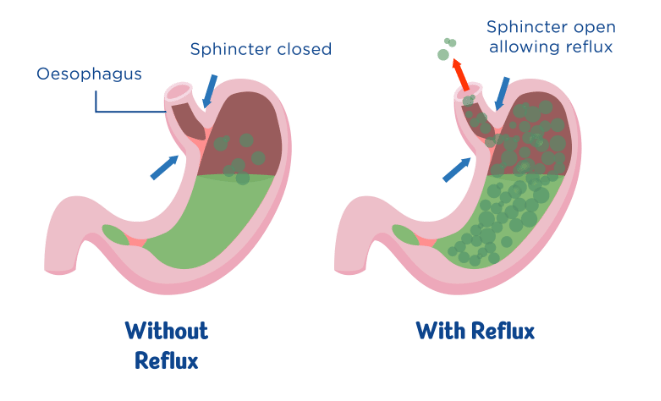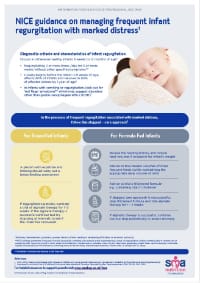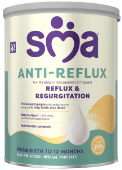What is Gastro – Oesophageal Reflux?
- Gastro - oesophageal reflux (GOR) is an involuntary passage of gastric content from the stomach into the oesophagus. Reflux or regurgitation can occur daily in about 50% of infants under 3 months of age1.
- Although it is a normal physiological process in otherwise healthy infants2 and common in the first year of life3, it can cause significant parental worry and anxiety4.
- This article features resources that will update you on managing parental anxiety, advice to give to parents and NICE guidance for management of GOR2.
Why does reflux occur?
Reflux occurs when the involuntary passage of gastric content from the stomach enters into the oesophagus and is commonly seen during or shortly after feeding5 and is primarily due to the functional immaturity of the lower oesophageal sphincter6. This usually resolves in 90% of affected infants before 1 year of age3.
Image of stomach when reflux occurs and when there is no reflux

Advising and reassuring parents and carers
NICE guidance for the management of GOR, states that first line treatment should include parental support and reassurance2.
It is important to offer parents’ advice about GOR and reassure them that in healthy term infants, effortless regurgitation of feeds2:
- Is very common (it affects at least 40% of infants)
- Usually begins before the infant is 8 weeks old
- May be frequent (5% of those affected have 6 or more episodes each day)
- Usually becomes less frequent with time (it resolves in 90% of affected infants before they are 1 year old)
- Does not usually need further investigation or treatment.
You may find this useful:

CPD accredited e-Learning, a guide for how healthcare professionals can use motivational interviewing techniques to support and inform parents and carers.
Red flag symptoms:
When reassuring parents and carers about regurgitation, advise them that they should return for review if any of the following red flag symptoms occur as it may suggest a disorder other than GOR2:
- The regurgitation becomes persistently projectile.
- There is bile-stained (green or yellow green) vomiting or haematemesis (blood in vomit)
- There are new concerns, such as signs of marked distress, feeding difficulties or faltering growth
- There is persistent, frequent regurgitation beyond the first year of life2.
NICE Guidance on managing frequent regurgitation associated with marked distress in formula fed infants
When regurgitation is frequent and associated with marked distress in formula fed infants, NICE recommends a stepped care approach2 as shown below. There are separate guidelines for managing this in breastfed infants.
A Stepped Care Approach in formula fed infants2
- Review the feeding history and reduce feed volumes if excessive for infant’s weight.
- Advice to trial smaller volumes of more frequent feeds (while maintaining the appropriate daily volume of milk)
- Advice to trial a thickened formula† e.g., containing starch thickener††
- If the stepped care approach is unsuccessful, stop using the thickened formula and trial alginate therapy for 1 – 2 weeks
- If alginate therapy is successful, continue use but stop periodically to assess recovery

Download an infographic tool to help manage frequent infant regurgitation
Trying a nutrition first approach
SMA® Anti-Reflux is a thickened formula for the dietary management of reflux and regurgitation and is suitable from birth until 1 year of age. Starch-thickened formulas have been shown to significantly reduce the number of daily regurgitation episodes7**.
SMA® Anti-Reflux is a Food for Special Medical Purposes and is a suitable thickened formula for managing regurgitation as recommended by the NICE stepped care approach.2

SMA® Anti-Reflux is the only Anti-Reflux formula that offers a unique combination of easily digestible starch and 100% whey, partially hydrolysed protein, to help manage reflux and regurgitation7,8.
Digestible starch thickeners do not interfere with the availability of calcium, iron and zinc compared to indigestible thickeners, such as Carob bean gum9,10.
†Thickened formulas may require a fast flow teat
††Not all thickened formulas are the same, consider one which also contains partially hydrolysed protein which allows for faster gastric emptying11.
**p<0.0001, compared to a standard formula

